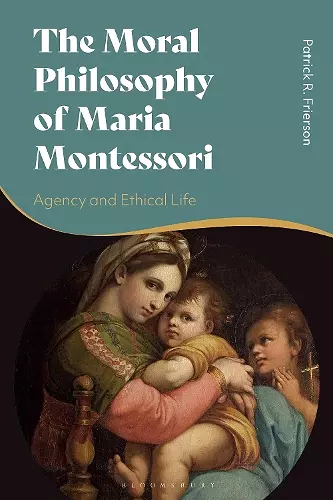The Moral Philosophy of Maria Montessori
Agency and Ethical Life
Format:Hardback
Publisher:Bloomsbury Publishing PLC
Published:17th Nov '22
Currently unavailable, our supplier has not provided us a restock date

Places the moral philosophy of Maria Montessori, one of the most influential educationalists of the 20th century, in the context of the history of philosophy in order to develop a new account of human agency.
In the first scholarly exposition of Maria Montessori’s moral philosophy, Patrick R. Frierson presents an empirically-grounded ethics that takes its start from our tendency to strive for excellence and emphasizes mutual respect, social solidarity, and love.
Laying out a compelling, Montessorian approach to ethical life, Frierson constructs an account of human agency based on children, who when attentively at work on self-chosen tasks, have agency worthy of respect. Through this interpretation of children’s agency, he introduces the core concept of Montessorian “character”: in Montessori’s ethics, character provides the ultimate value worthy of direct respect, and those with character have a natural tendency to respect others. Character is enhanced through corporate forms of agency that Montessori calls “social solidarity.”
Weaving this educationalist’s ethics with theory from Nietzsche, Aristotle, Kant, Hegel, and Marx, Frierson places Montessori in the context of the history of philosophy. His study effectively unites philosophy and education, showing how human ethical life can be enhanced through a moral theory based on the respectful attention to the lived agency of young children.
Maria Montessori revolutionized pedagogy by encouraging the teacher to "follow the child," rather than the other way around. In this detailed reconstruction of her philosophy, Frierson argues that the ideas underlying her practice can revolutionize our understanding of ourselves and our ideals. An original, rigorous, and provocative study that should be of interest to educators and philosophers alike. * Tamar Schapiro, Professor of Philosophy, Massachusetts Institute of Technology, USA *
In this carefully argued and exhaustively researched book, Patrick R. Frierson offers a much-deserved vindication of Maria Montessori’s contributions to moral philosophy, presenting her as a first-rate philosopher who warrants serious attention in contemporary debates on ethical life. By actualizing the relevance of Montessori’s contributions to ethical theory and the importance of recognizing the experience of young persons as generative for moral thought, Frierson’s own work makes a significant and lasting contribution to the field. * Notre Dame Philosophical Reviews *
ISBN: 9781350176379
Dimensions: unknown
Weight: unknown
272 pages